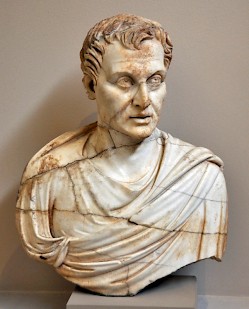Menander
Menander (342-291): Athenian playwright, author of many comedies, which are only fragmentary preserved and best known from Roman adaptations.

The comedies of the Athenian playwright Menander are completely different from those of Aristophanes. Classicists distinguish the Old and New Comedy. In the plays of Menander, the story is more or less credible (if one is willing to accept doppelgänger and frequent cases of mistaken identity and misunderstanding) and the characters are realistic. Often, the comedy also contains a tragic element, which makes it even more convincing.
Unfortunately, only one play, The bad-tempered man, survives, together with considerable portions of another five. However, many of Menander's comedies were translated into Latin and adapted by authors like Terence and Plautus, and these plays have survived.
They were extremely popular. Julius Caesar, on crossing the Rubico, quoted Menander: "the die is cast". Pliny the Elder called the poet a man litterarum subtilitati sine aemulo genitus, "unrivalled for perception in literary knowledge". During the Renaissance, several of them were translated into modern languages.